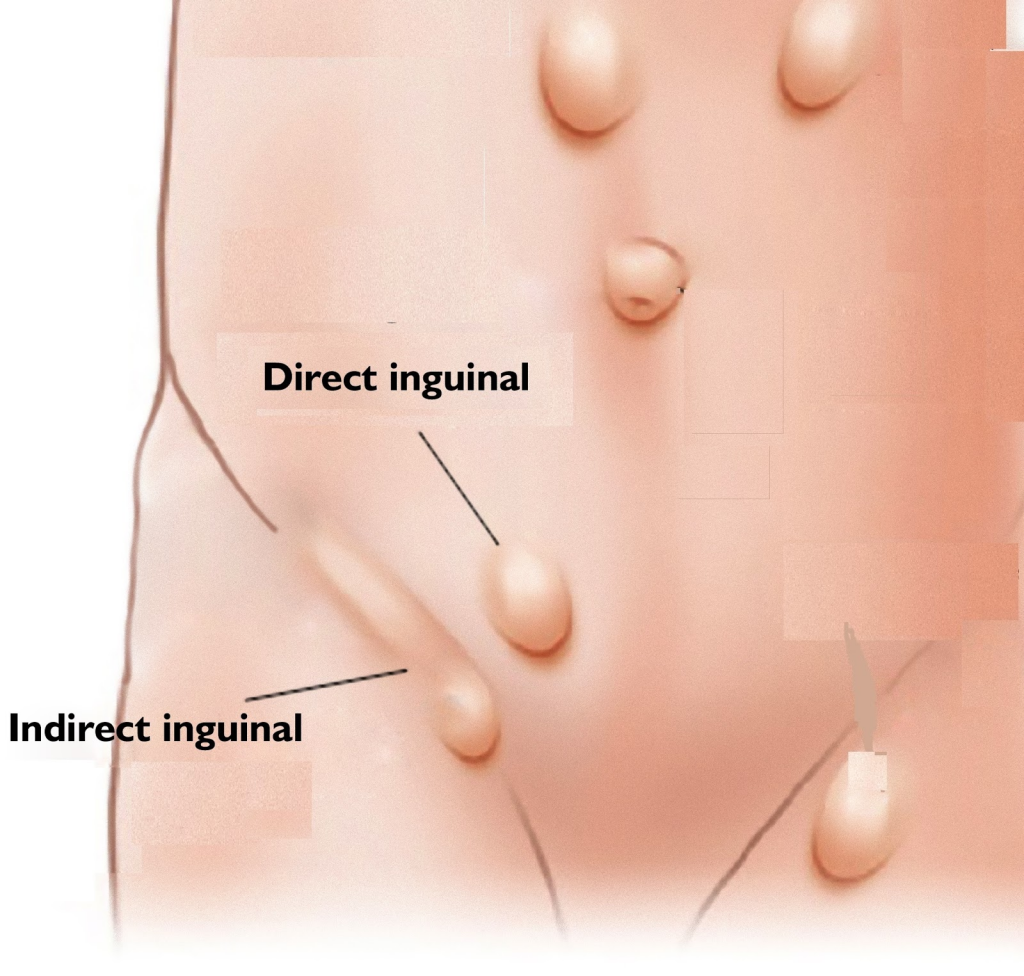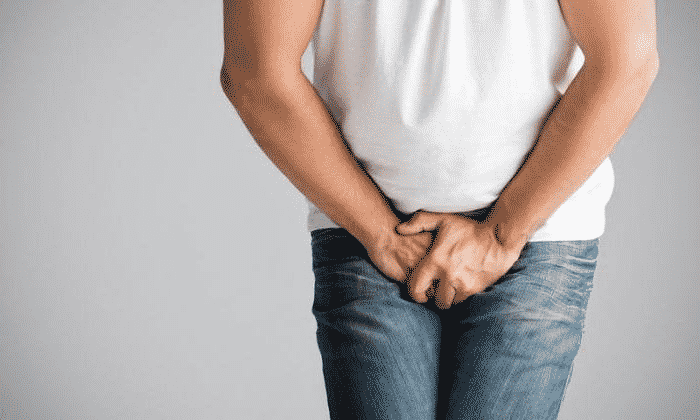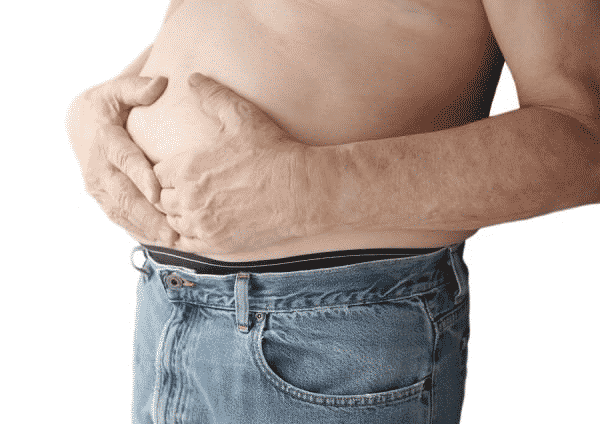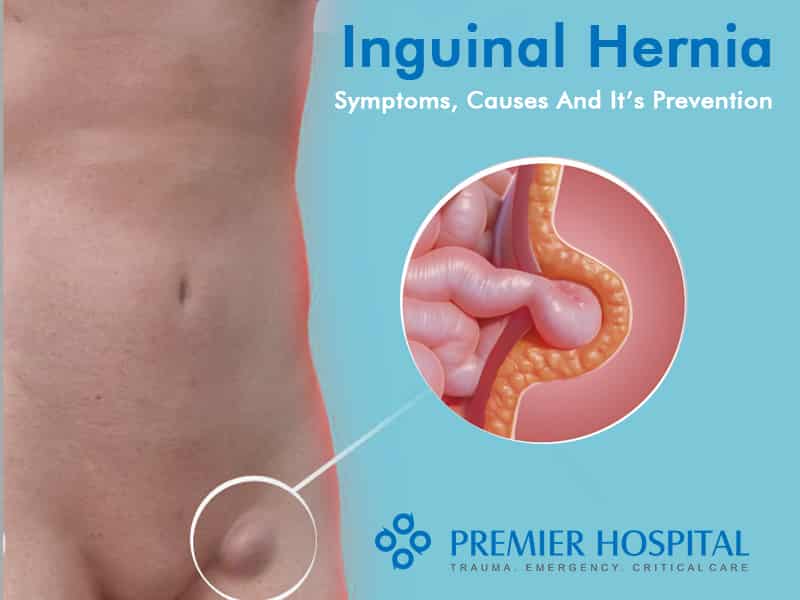Understanding Inguinal Hernia
by Premier Hospitals | February 28, 2019 |
What Is An Inguinal Hernia?
When w feel a pain in our groin while coughing or lifting something heavy, it is a sign that one might have an inguinal hernia. They develop when fatty tissue or small intestinal tissues push through a weak area in the abdominal wall alongside the right or left inguinal canal.
Both men and women have inguinal canals. In men, the testis usually descends through the inguinal canal into the scrotum a few weeks before birth. In women, each canal is located in the passage around the ligament of the uterus. If any individual has a hernia near or in the passageway, it results in a bulge which is painful during movement.
An inguinal hernia might not be serious in some cases, but sometimes it can cause life-threatening complications.
What Are The Types Of Inguinal Hernia?
An inguinal hernia is classified into four different types, which follows
Indirect Inguinal Hernia
It is the most common type of hernia and often occurs in premature births. It also commonly occurs in males and can occur at any time during our life.
 Direct Inguinal Hernia
Direct Inguinal Hernia
This type of hernia often occurs in adults as age increases. It is believed that weakening muscles with age might lead to a direct inguinal hernia. According to the National Institute of Diabetes and Digestive and Kidney Diseases (NIDDK), men are most likely to get this direct inguinal hernia.
Incarcerated Inguinal Hernia
An incarcerated inguinal hernia occurs when tissue that has protruded into the groin gets stuck and is not reducible. It means the tissues can’t be pushed back into its place.
Strangulated Inguinal Hernia
This type of hernias causes serious health issues. The muscle surrounding the weakened area of the abdomen clamps down around the tissue, cutting off the blood supply to the small intestine. Strangulated hernias are life-threatening and require emergency medical care.
How To Recognize Inguinal Hernia?
In most of the cases, hernias may not show symptoms. However, you can recognize hernias by observing the following signs.
- A bulging area on either side of the pubic bone. It becomes more noticeable when we are upright, especially when we cough or strain
- Burning or aching sensation near the swelling
- Pain or discomfort in the groin, especially when we cough, exercise or while bending over

- A heavy feeling or dragging sensation in the groin
- Weakness or pressure in the groin
- Occasional pain and swelling around the testicles when the protruding intestine descended into the scrotum of men
You may able to push back the hernia gently into your abdomen when you lie down to relieve some discomfort. Lying with your pelvis little higher than your head may also help. However, the best way is to consult a doctor immediately if you notice such symptoms.
What Are The Causes And Risk Factors Of Inguinal Hernia?
There is no specific cause for this type of hernia. It is believed that weak spots within the abdominal and groin muscles are to be a major contributor to this condition. Sometimes extra pressure on this particular area of the body can eventually lead to a hernia mostly seen in conditions that lead to:
- Increased pressure in the abdomen
- Strenuous physical activities
- Pregnancy
- Having a pre-existing weak spot in the abdominal wall
- Overstraining during bowel movements or urination
Some of the risk factors that can increase the chances of this condition include:
- Heredity (Family history)
- Having a prior inguinal hernia
- Being male
- Being older (as muscles weaken with age)
- Premature birth and low birth weight

- Being overweight or obese
- Chronic constipation
- Cystic fibrosis
- Chronic cough or sneezing
How To Prevent Inguinal Hernia?
A congenital defect which makes one susceptible to an inguinal hernia cannot be prevented but can be cured surgically. However, we can reduce the risk of occurrence or the severity of the hernias by following some tips which include:- Maintaining a healthy weight
- Eating high-fibre foods like fruits, vegetables and whole grains
- Lifting heavy objects carefully or avoiding lifting heavy things. If it is necessary to lift something heavy, always bend on your knees to lift, not your waist.
- Quit smoking

Early diagnosis and treatment can help cure inguinal hernias. If you neglect the treatment, it can become life-threatening and even lead to death. Consult our experts at Premier Hospital right away if you experience any of the symptoms mentioned above or if you feel you are prone to such a condition.
About The Hospital:
Since the inception of Premier Hospital in 1991 till today, we have grown to unprecedented levels, due to our excellence in medical sciences and healthcare. Premier Hospital is the creation of Dr Mahesh Marda and when it was first established, was only a small, 30-bed hospital facility. Back then, we provided only secondary care to patients, but that certainly has changed in the present landscape.















